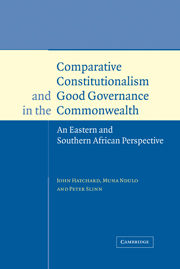 Comparative Constitutionalism and Good Governance in the Commonwealth
Comparative Constitutionalism and Good Governance in the Commonwealth Published online by Cambridge University Press: 23 June 2009
Ordinary men and women need support in their fight to claim and protect their liberties. And their natural protectors are the courts.
The emergence of constitutions with wide-ranging and justiciable Bills of Rights has rekindled public awareness and interest in the role of courts through which to seek individual and collective justice and the sustenance of a democratic culture. The maintenance of an independent and accountable judiciary is fundamental to achieving such goals and these issues are discussed in the first part of the chapter. The second part considers the role of judges in undertaking their task as ‘guardians of the constitution’.
Judicial independence
Judicial independence is recognised in many international and regional human rights instruments and constitutes one of the Commonwealth's fundamental political values. The principle is also enshrined in all the ESA constitutions with the Ugandan Constitution encapsulating the point:
In the exercise of judicial power, the courts shall be independent and shall not be subject to the control or direction of any person or authority.
Whilst discussion often centres on protecting and promoting the rights of judges in the higher courts, we must also recognise that magistrates require comparable protection, not least because it is they who deal with the vast majority of cases, both criminal and civil, and it is upon them that much of the public confidence in the legal system resides.
The main pillars of judicial independence are institutional and financial autonomy.
To save this book to your Kindle, first ensure no-reply@cambridge.org is added to your Approved Personal Document E-mail List under your Personal Document Settings on the Manage Your Content and Devices page of your Amazon account. Then enter the ‘name’ part of your Kindle email address below. Find out more about saving to your Kindle.
Note you can select to save to either the @free.kindle.com or @kindle.com variations. ‘@free.kindle.com’ emails are free but can only be saved to your device when it is connected to wi-fi. ‘@kindle.com’ emails can be delivered even when you are not connected to wi-fi, but note that service fees apply.
Find out more about the Kindle Personal Document Service.
To save content items to your account, please confirm that you agree to abide by our usage policies. If this is the first time you use this feature, you will be asked to authorise Cambridge Core to connect with your account. Find out more about saving content to Dropbox.
To save content items to your account, please confirm that you agree to abide by our usage policies. If this is the first time you use this feature, you will be asked to authorise Cambridge Core to connect with your account. Find out more about saving content to Google Drive.